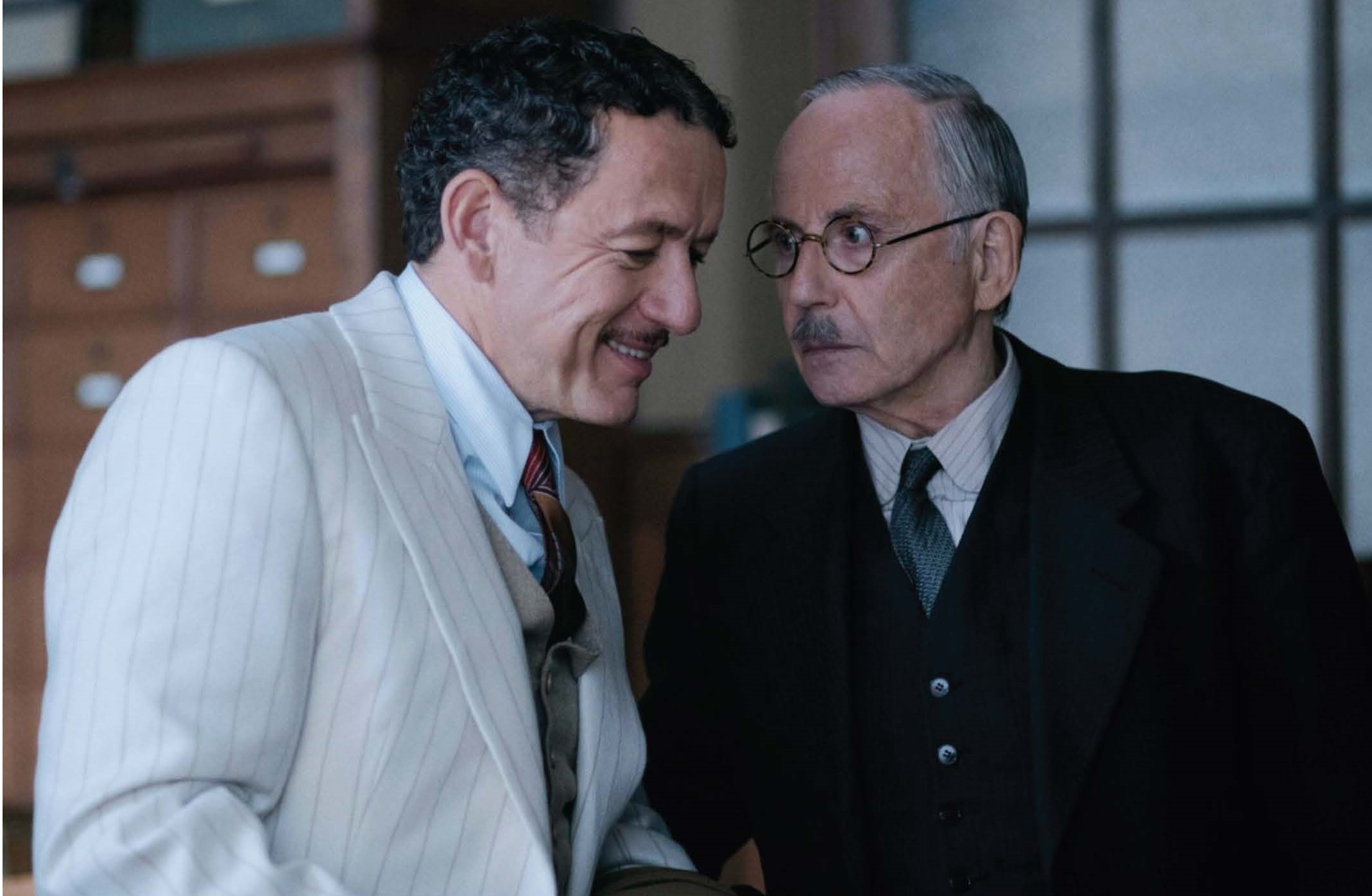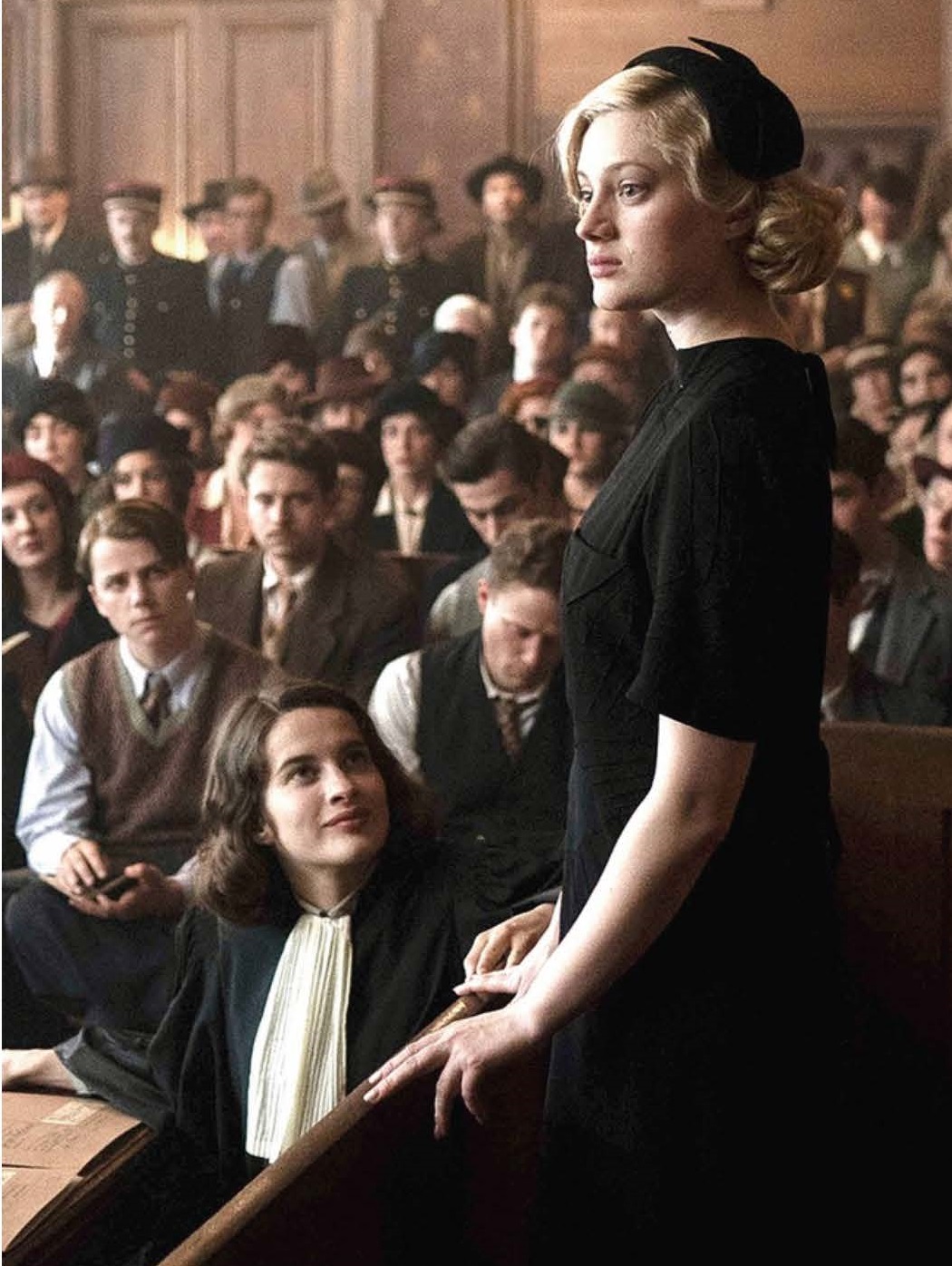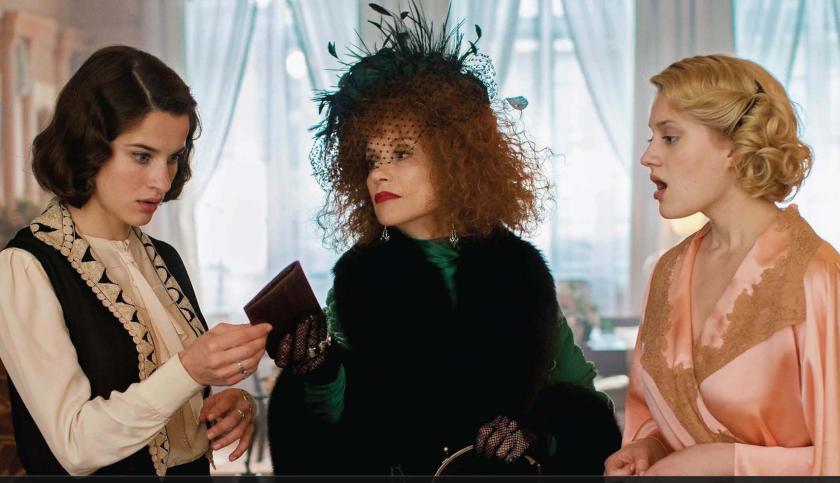For his latest pick’n’mix sortie into the world of the women’s picture, François Ozon has gone back to the 1930s and a popular play of the time, Mon Crime (1934). In his hands it emerges as an île flottante of a film that slips down easily but isn’t that nourishing, even though he adds some crunchier elements along the way.
The nub of both the play and two earlier film adaptations is a knotty plot featuring an innocent woman accused of a crime that paradoxically makes her fêted and successful. Ozon’s heroine is another such, a pert ingenue blonde actress, Madeleine (Nadia Tereszkiewicz), who’s on her beam ends and reduced to sharing a cheap, running-waterless flat with a smart novice lawyer, Pauline (Rebecca Marder), who, as is standard in such plots, is a perky brunette.
Then a big producer is found dead and, as Madeleine had visited him shortly before the murder and rejected his aggressive advances, she is accused of the crime by a flat-foot of a detective and a pernickety investigating judge (an almost unrecognisable Fabrice Luchini, pictured below, right, with Dany Boon)). She and Pauline, who acts as her defending counsel, create a drama of their own for her to perform in the courtroom, a tearful turn from the stand that she urges the all-male jury to pass on to their female relatives. It canonises her as a wronged impoverished woman who killed in self-defence, and the offers of acting jobs start to roll in.
This is only half the plot, however. There’s a faux climax as the two women celebrate their triumph in their new home, a stylish rented villa on the edge of Paris. Then a grande dame of the silent movie era arrives on their doorstep to deliver a bombshell, and all three have to connive to turn the situation to their advantage.  The silent-movie actress, Odette Chaumette, is kitted out in a long fur-trimmed coat, with flame-red frizzy hair like the maribou feathers she likes to sport round her neck. She is made to look like something from a Toulouse-Lautrec poster and was apparently modelled on one of his subjects, Sarah Bernhardt. A forest of fascinators jiggles on her head as she talks, but it’s her face that compels your attention: pale and Garboesque, with a scarlet gash of lipstick for a mouth – one, amusingly, that never stops talking. It is Isabelle Huppert having huge fun, possibly on cruise control as yet another maddening headstrong woman, but who cares?
The silent-movie actress, Odette Chaumette, is kitted out in a long fur-trimmed coat, with flame-red frizzy hair like the maribou feathers she likes to sport round her neck. She is made to look like something from a Toulouse-Lautrec poster and was apparently modelled on one of his subjects, Sarah Bernhardt. A forest of fascinators jiggles on her head as she talks, but it’s her face that compels your attention: pale and Garboesque, with a scarlet gash of lipstick for a mouth – one, amusingly, that never stops talking. It is Isabelle Huppert having huge fun, possibly on cruise control as yet another maddening headstrong woman, but who cares?
The script has just enough feminist ballast to keep it afloat. The women turn out to be adept at outwitting the male opposition (who are mostly fools and stuffed shirts) and score a victory for their cause; and those women bold enough have been given a way to make crime pay, provided they can act the part. Ozon’s script has a lot of fun with the language and mechanics of the theatre. There is no higher praise here than being called a grande tragédienne. When the pompous prosecutor says Madeleine is a “wonderful actress”, it’s a double irony as she is indeed performing a script, yet one that is essentially true, because her innocence is real. Ozon also plays around with transforming flashbacks into black-and-white film footage and even recreates a whole film-set scene for Madeleine’s screen debut as Marie Antoinette on the scaffold.
He has a firm grasp on the basics of this kind of period film, and not just the look of its costumes and interiors. It has the tone of 1930s Hollywood, breezy and brisk, tilting at male chauvinism and always verging on melodrama. Its romantic gestures are accompanied by soupy violins, even though there isn’t a single true romance in the piece. Madeleine’s fiancé Andre (Edouard Sulpice) is a shallow, work-shy, spoilt boy, and only Pauline shows signs of having actual feelings: for Madeleine, unfortunately for her. (Madeline and Pauline go to see Billy Wilder’s debut film Mauvaise Graine after the encounter with the brutal producer, a tale, interestingly, of another spoilt rich boy who’s run out of cash.)
 The greatest pleasure to be had here may be seeing the secondary characters being put through their paces, and not just Huppert. They not only look the part but have the stagey quality of period comedies. Luchini is a marvel of articulation – just to hear him say crapuleux is pleasure enough. He is also given a punning term to get his mouth round that conflates connaisse and connasse, dutifully translated into a rude English pun for the subtitles. Another leading light from a distant era, André Dussollier, plays Bonnard, the tyre-manufacturer father of Madeleine’s fiancé; and contributing funny turns are the gnome-like man playing Luchini’s clerk, Trapu (Olivier Broche), and the bustling concierge at Madeleine’s building, Madame Jus (Myriam Boyer), who has an obligatory small dog and a small mind to go with it.
The greatest pleasure to be had here may be seeing the secondary characters being put through their paces, and not just Huppert. They not only look the part but have the stagey quality of period comedies. Luchini is a marvel of articulation – just to hear him say crapuleux is pleasure enough. He is also given a punning term to get his mouth round that conflates connaisse and connasse, dutifully translated into a rude English pun for the subtitles. Another leading light from a distant era, André Dussollier, plays Bonnard, the tyre-manufacturer father of Madeleine’s fiancé; and contributing funny turns are the gnome-like man playing Luchini’s clerk, Trapu (Olivier Broche), and the bustling concierge at Madeleine’s building, Madame Jus (Myriam Boyer), who has an obligatory small dog and a small mind to go with it.
It’s hard to decide whether Ozon intended us to detect an undertow of cynicism beneath the film’s frothy surface. He’s both recycling this kind of project’s superficial kerb appeal while feeding off its wrong-headedness. Whatever: it’s entertaining fodder on a drab day.















Add comment